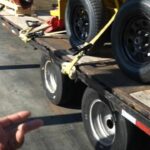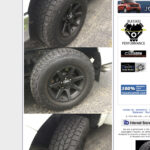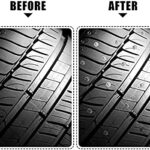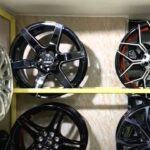There are a few reasons why your trailer tires might be getting hot. If you’re frequently towing a heavy load, the increased friction can cause the tires to heat up. If the trailer isn’t properly ventilated, the heat from the sun can build up inside and cause the tires to get hot.
Another possibility is that the bearings in the hubs could be going bad, which would cause friction and heat the tires. Whatever the reason, it’s important to keep an eye on your trailer tires and make sure they don’t get too hot.
If you’re noticing that your trailer tires are getting hot, there could be a few different reasons why. First, it’s important to make sure that the tire pressure is where it needs to be. If the pressure is too low, it can cause the tires to heat up.
Additionally, if you’re regularly hauling heavy loads, that could also be causing the tires to get hot. There are a few things you can do to help keep your trailer tires from getting too hot. First, check the tire pressure regularly and inflate the tires as needed.
Secondly, try not to overload your trailer – distribute the weight evenly and don’t exceed the recommended limit. Lastly, if you’re going to be driving for long periods in hot weather, consider investing in tire covers or using reflective tape on the tires to help keep them cooler. By following these tips, you can help prevent your trailer tires from getting too hot and potentially experiencing a blowout.
You May Like
- Set of 4 New Premium Radial Trailer Tires 225/75R15 10PR, Brand: FREE COUNTRY
- Full cap ply ( nylon overlay cross entire tread area), significant upgrade from most other…
- Featured “Scuff Guard” ring on tire wall for better tire side protection
- 7 mm deep tread depth vs 5.6 mm of other cheap competitors, has longer mileage life
- Premium FREE COUNTRY Heavy Duty 10 ply rated, load Range E, 2400LBS capacity!
- FULL nylon cap ply overlay cross entire tread area, significant upgrade from most other…
- Featured “Scuff Guard” ring on tire wall for better tire side protection
- This tire is designed for the trailer use only, rims are not included.
- Treadlife: 60,000 miles
- Tire Only
- Season: All Season, Performance: Performance
- Car Type: Truck/SUV
- LONG-LASTING RELIABILITY: Durable 15 inch tires pre-mounted on 15 inch rims, built with…
- HASSLE-FREE SETUP: Pre-assembled trailer tire and rim set ensures quick installation on most…
- PACK OF 2: Convenient 2 pack of trailer tires and trailer wheels delivers efficient…
- VERSATILE PERFORMANCE: Rated up to 50 PSI, each trailer tire offers stable handling and smooth…
- 2 new premium full nylon cap ply 8PR ST205/75R15 Radial trailer tires, brand: FREE COUNTRY
- Full nylon cap ply ( nylon overlay cross entire tread area), significant upgrade from most…
- Featured “Scuff Guard” ring on tire wall for better tire side protection
- 7 mm deep tread depth vs 5.6 mm of other cheap competitors, and longer mileage life
Safety is always paramount when operating a vehicle – take care of your tires and they’ll take care of you!
Why are My Trailer Tires Getting Hot?
Is It Normal for Trailer Tires to Get Hot?
Yes, it is normal for trailer tires to get hot. This is because when trailers are towed behind a vehicle, the friction from the road can cause the tires to heat up. If you notice that your trailer tires are getting hot, you can try to reduce the amount of time that they are in contact with the ground by using Jack stands.
You should also make sure that you are not overloading your trailer and that the tire pressure is at the proper level. If you have any concerns, you should always consult with a professional mechanic before attempting to make any changes.
What Does It Mean When Your Tire is Hot?
When your tire is hot, it means that it’s been working hard and is under a lot of stress. The heat indicates that the tire is beginning to break down and could potentially fail. If you’re driving on a hot day, or if you’ve been driving for a long time, be sure to check your tires periodically to make sure they’re not getting too hot.
If they are, pull over and let them cool down before continuing on your journey.
How Do I Stop My Tires from Overheating?
If you’re looking to keep your tires from overheating, there are a few things you can do. First, make sure that your tires are properly inflated. This will help to ensure that they don’t get too hot while you’re driving.
Second, avoid driving in excessive heat whenever possible. If it’s not necessary to be out in the middle of the day during a heat wave, stay indoors where it’s cooler. Third, if you must drive in hot weather, try to avoid stop-and-go traffic as much as possible.
This can cause your tires to overheat from the constant starting and stopping. Fourth, have your cooling system checked regularly to make sure it’s functioning properly. A coolant leak can lead to your tires overheating, so it’s important to keep an eye on this.
Finally, if you do find yourself with overheated tires, pull over and let them cool down before continuing on your journey. Do not pour water on them, as this can damage the tire itself. Simply let them sit for a bit until they’ve cooled off enough to safely continue driving on them.
Why Do Rv Tires Heat Up?
RV tires heat up for a variety of reasons. The most common cause is friction from the road. As the tire rubs against the pavement, it generates heat.
This is why you’ll often see smoke coming from a tire that has been driven too hard or for too long. Other causes of RV tire heat include underinflation and overloading. If a tire is not properly inflated, it will generate more friction as it rolls down the road.
This can lead to overheating, which can damage the tire and potentially cause a blowout. Overloading a vehicle also puts extra strain on tires, causing them to work harder and generating more heat in the process. If you notice your RV tires are getting hot, pull over and let them cool down before continuing your journey.
Running them at high temperatures for extended periods can shorten their lifespan significantly. Check your owner’s manual for specific recommendations on how to care for your tires and keep them running at their best.
Why are My Tires Getting Hot
If you’ve ever felt your tires and they were hot to the touch, you may have wondered why. There are a few different reasons why tires can get hot and it’s important to know what they are so that you can avoid any potential problems. One reason why tires can get hot is overinflation.
When tires are overinflated, they tend to ride on the center of the tread which causes more friction. This extra friction then causes the tire to heat up more than usual. If you think your tires may be overinflated, it’s important to check them with a tire pressure gauge and let some air out until they reach the proper inflation level.
Another reason for hot tires is underinflation. Unlike with overinflation, underinflation causes the tire to ride on the outside edges of the tread. While this doesn’t create as much friction as overinflation does, it still creates enough to cause the tire to heat up.
Underinflated tires also wear down quicker since they’re not making full contact with the road which can lead to even more problems down the road. Again, if you think your tires may be underinflated, use a tire pressure gauge to check them and inflate them accordingly. Finally, another common cause of hot tires is simply driving too fast.
The faster you go, the more friction is created between your tires and the road surface which in turn makes them hotter. If you find that your tires are consistently getting hot (even when properly inflated), try slowing down a bit and see if that makes a difference.
How to Tell If Trailer Tires are Bad
If you’re like most people, you don’t think about your trailer tires until something goes wrong. But if you take a little time to inspect them regularly, you can avoid costly problems down the road. Here’s how to tell if trailer tires are bad:
1. Visual inspection: Check the tread for wear and tear, and look for cracks or splits in the sidewalls. If the tread is worn down to the point where it’s bald, or if there are any major cracks or splits, it’s time to replace the tire.
2. Bounce test: Place your hand on top of the tire and push down firmly. If the tire bounces back more than once, it’s still got some life left in it. If it doesn’t bounce back at all, or if it feels spongy when you push on it, that means the tire is too worn out and needs to be replaced.
3. Pressure test: Use a tire pressure gauge to check the inflation level of each tire (including the spare). The ideal pressure will vary depending on the size and load capacity of your tires, so consult your owner’s manual or Tire Rack for specific recommendations. Under-inflated tires can overheat and fail prematurely, so keep an eye on this number and inflate it as needed. If you follow these simple tips, you’ll help extend the life of your trailer tires and avoid costly breakdowns down the road!
Boat Trailer Tires
Boat trailer tires are an important part of towing your boat. They provide the necessary grip and stability to keep your boat secure while you’re driving. There are a few things to consider when choosing the right tire for your boat trailer.
The first thing to think about is the size of the tire. You’ll need to make sure that the tire is big enough to handle the weight of your boat. The next thing to consider is the type of terrain you’ll be driving on.
If you’re planning on doing a lot of off-roading, then you’ll need a tire that can handle that kind of abuse. Finally, you’ll need to decide on a budget for your tires. Boat trailer tires can range in price from around $60 up to $200 or more.
It’s important to find a tire that fits both your needs and your budget. With these things in mind, you should be able to find the perfect boat trailer tire for your needs. Just remember to do some research before making your final purchase!
Travel Trailer Tires
We all know how important it is to have good tires on our vehicles. But did you know that your travel trailer has special tires that are designed just for trailers? That’s right, there are specific tires made for travel trailers that offer several advantages over regular passenger car or truck tires.
Here’s what you need to know about choosing the right tires for your travel trailer. The first thing to understand is that not all tire sizes are created equal. There are a few different size designations for trailer tires, and each one corresponds to a different weight limit.
For example, ST205/75R14 means that the tire is 14 inches in diameter, has a width of 205 millimeters and can carry up to 2,540 pounds. So when you’re shopping for new travel trailer tires, be sure to pay attention to the size designation so you choose one that can handle the weight of your trailer. In addition to size, another important factor to consider is load range.
The load range of a tire indicates how much weight it can support while carrying a load. Tires with higher load ranges can support heavier weights than those with lower load ranges. For example, a tire with an “LT” (light truck) load range can support more weight than a tire with an “ST” (special Trailer) load range.
When shopping for new travel trailer tires, be sure to choose ones with an appropriate load range for your particular trailer setup. Finally, you’ll also want to pay attention to speed rating when selecting new travel trailer tires. The speed rating tells you the maximum speed at which the tire can safely operate.
For example, a “C” speed rating means the tire can be driven at speeds up to o 50 miles per hour, while an “E” speed rating means it can be driven to o 80 miles per hour.
Best Trailer Tires
There are a lot of factors to consider when purchasing trailer tires. You want to make sure you get the best possible tires for your money. Here are some things to keep in mind when shopping for trailer tires:
1. LoaCapacityty – The load capacity is the most important factor to consider when choosing trailer tires. Make sure the tires you select can handle the weight of your trailer and its contents.
2. Speed rating – The speed rating tells you the maximum speed at which the tire can be safely driven. Make sure the tires you select have a speed rating that meets or exceeds the top speed of your tow vehicle.
3. Tire size – Trailer tires come in a variety of sizes, so make sure you select the correct size for your application. Larger trailers may require specialty sizes that are not readily available at most tire stores.
4. Price – Trailer tires can be expensive, so it’s important to shop around and compare prices before making a purchase.
13 Inch Trailer Tires
If you have a trailer that you frequently use for hauling things around, then you know how important it is to have good tires on it. After all, the last thing you want is to be stranded on the side of the road with a flat tire. That’s why it’s important to invest in quality tires like the 13-inch trailer tires.
These tires are designed specifically for trailers and RVs, so you can rest assured that they’ll be able to handle the weight and stress that comes with hauling a heavy load. Additionally, 13-inch trailer tires are typically made from high-quality materials that can withstand regular wear and tear. So if you’re looking for a reliable tire that will last mile after mile, then look no further than the 13-inch trailer tire.
Conclusion
If you’re wondering why your trailer tires are getting hot, there are a few possible explanations. It could be that the brakes are dragging, the bearings are worn, or the axle alignment is off. If you suspect any of these issues, it’s best to take your trailer to a qualified technician for inspection and repairs.












